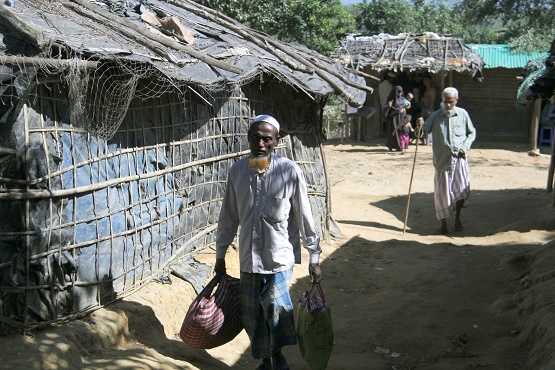
Rohingya Muslims arrive in an unregistered camp in Kutupalong, Cox's Bazar district of Bangladesh in December 2016, fleeing deadly violence by security forces in their home Rakhine State in Myanmar. (ucanews.com photo)
Bangladesh's Prime Minister made a suggestion to Myanmar's special envoy, U Kyaw Tin when he met her in Dhaka recently to discuss the problem of displaced Rohingya people, a persecuted Muslim minority from Myanmar's Rakhine State.
Prime Minister Sheikh Hasina said that Myanmar has to be sincere in addressing the root causes of the problem: the denial of some 1.2 million Rohingya of their basic rights, plunging them into deep frustration, and to stop the spread of religious extremism and militancy.
Tin's visit on Jan. 10-13 came after 65,000 Rohingya entered Bangladesh fleeing a brutal crackdown in retaliation for an attack on Myanmar border posts in Rakhine on Oct. 9 that killed nine police. The exodus continues.
Those taking shelter in Cox's Bazar in Bangladesh alleged atrocities by Myanmar law enforcers in Rakhine, including killings and rapes. The incidents led to an urgent meeting of foreign ministers of the Organization of Islamic Cooperation in Malaysia on Jan. 19.
Let us shortly consider the aspects of Tin's Bangladesh visit, the Malaysia meeting and Sheikh Hasina's remarks.
Kyaw Tin's focus, while in Bangladesh, was Myanmar's security against the backdrop of October's militant attack. Myanmar blames the Rohingya Muslims for the attack, and sought Bangladesh's assistance in combating militancy.
While Bangladesh has assured full cooperation, it suggested that Myanmar take back some 400,000 Rohingya, including 65,000 new entrants and provide citizenship to the general Rohingya population whose rights to free movement, land and marriage have been seriously restricted in Buddhist-majority Myanmar.
Denied of basic human rights, these Rohingya moved not only to Bangladesh, but to Pakistan, Saudi Arabia, Malaysia, Thailand, Indonesia and many other Arab and Southeast Asian countries. They risked their lives to cross the Bay of Bengal or the Andaman Sea to enter Malaysia or Thailand.
One of the worst incidents was the discovering of mass graves of suspected Rohingya people in the Thai and Malaysian jungles in May 2015.
The deprivation and statelessness of the Rohingya are subjects likely to be discussed in the Islamic organization's meeting in Malaysia. They will likely demand that Myanmar provides citizenship and all other political, civil, social and economic rights to the Rohingya to stop the crises created in South and Southeast Asia.
Deprivation may turn into frustration making it is easy for Rohingya people to accept extreme ideologies. How can the huge population of Rohingya people, who have been living in Myanmar for generations, be denied citizenship? Is it only for the fact that they are of a different faith?
Now, let us assume a scenario that the Islamic organization members, extremely angered by what Myanmar is doing to the Rohingya Muslims, decide to offer them all a new home in their countries. Eventually, they will decide that all the Buddhists from their countries should be sent to Myanmar or other Buddhist-majority countries. Thus, there develops a trend that nation states are developed based on religion. Then, the Hindu-majority India decides to oust people of all other faiths and Christian-dominated America and Europe say that they cannot have people of other faiths too.
What happens then? Would it be nice? Recalling recent history may help. India and Pakistan were partitioned based on religion in 1947. Pakistan broke down in 1971 when Bangladesh was born following a bloody war of nine months, proving that making states based on religion does not work.
I hope that Myanmar does not take the route taken by the then leaders of undivided India in 1947. The radical Buddhists, who are opposing the citizenship of the Rohingya Muslims must understand this. Mahatma Buddha has not only asked human beings to love all human beings, but all living things. Radicals in Myanmar cannot and must not forget it.
On the other hand, there are questions over the role of the international community. It has not done its part in forcing Myanmar to stop the persecution of the Rohingya. Why have they failed? Is it not for the fact that Myanmar has huge natural resources and they didn't want to strain their relationships with Myanmar?
Now is the period of the U.N.'s sustainable development goals. They say none should be left behind and that growth must be inclusive. If that is to be done, what steps is the world taking to include the Rohingya Muslims?
Let the world think through things seriously and not leave it to the Islamic organization alone, because Rohingyas are human beings before they are Muslims. Building a nation based on the hatred of others is nothing but going backwards. Let us not take the path of hatred that hardens hearts, but of love and humanity that softens hearts.
Porimol Palma is a Dhaka-based journalist and senior correspondent with The Daily Star, a leading English daily in Bangladesh.


